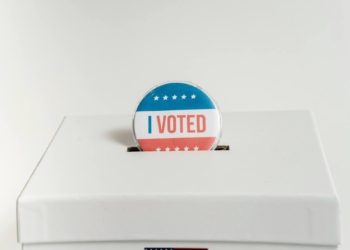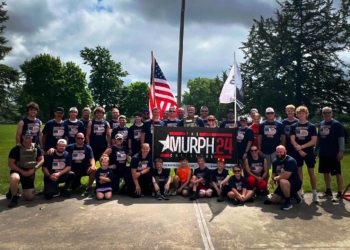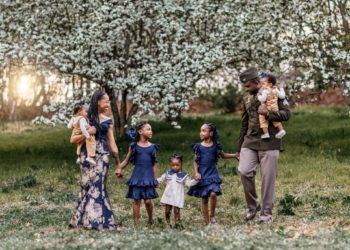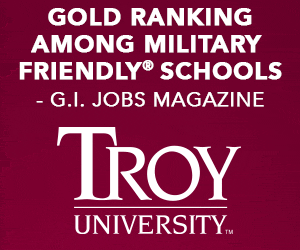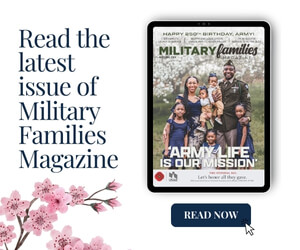Sooner or later, most service members and military families encounter negative comments or opinions from civilians with no connection to the military. Sometimes, these are harmless statements from well-meaning civilian friends, such as “At least her deployment isn’t as long as some others!” Or, “I could never let my husband leave the kids for that long. They love him too much!” In those cases, the comments hurt, but military families learn to brush them aside.
Too often, however, the comments are intentionally hurtful. Neighbors say they don’t bother befriending military families because they are just going to move away soon. Employers sometimes deny jobs to military spouses because they fear quick turnover. Strangers in online comments will judge service members as inadequate parents for “abandoning” their families during deployments.
Shortly after the September 11th attacks, when my boyfriend was in boot camp, acquaintances would stop me to give me their political view on war. Friends told me I should break up with my boyfriend because he was just going to end up dead or with PTSD. More recently, a California high school teacher was caught on video ranting to his class about the low-life killers who join the military only because they are too dumb to get another job.
While these anecdotes may not represent every civilian, they are symptoms of a larger problem: Over the last generation, the military has grown increasingly separated from the civilian population. As the gap widens, so do the misconceptions. According to Eevi Jones, author of the book “Closing the Gap: Understanding your Service(wo)man,” the main misconceptions about military life center on moving and relocation, military culture, and deployment.
The growing gap between military families and civilians
During World War II, the entire country was united in the war effort. Every family knew someone who served and someone who had died. Civilians were involved in programs like Victory Gardens and scrap metal drives so that everyone could do their part.
The Vietnam War caused a military-civilian divide. This was a war that civilians did not want and they actively protested. However, because of the draft, large numbers of Americans were still involved in the military during the Baby Boomer generation.
Now, less than half of 1 percent of Americans serve as members of the active duty military, the lowest since before World War II. And increasingly, new recruits are coming from within existing military families. According to a Pew Research study from 2011, military veterans are twice as likely as their civilian counterparts to have a child serve in the military. And 80 percent of current service members have a parent or sibling who served.
The growing gap becomes obvious in the younger generation. Currently, only 15 percent of young adults have parents who served in the military. This is down from 40 percent in 1995. According to a 2013 survey by three West Point professors studying the estrangement between the military and civilian worlds, many civilians born between 1980 and 2000 “want no part of military life and want it separate from civilian life,” said sociologist Morten G. Ender, one of the study’s authors.
As a shrinking part of the population shoulders the increasing burden of war, this disconnect may be more comfortable for civilians, but it is increasingly painful for military families. According to Mike Haynie, director of the Institute for Veterans and Military Families at Syracuse University, “We’ve disconnected the consequences of war from the American public. As a result, that young man or woman putting on the uniform is much less likely to be your son or daughter, or even your neighbor or classmate. That is a dangerous place to be.”
Does this affect the future of the military?
The widening military-civilian divide is causing a cycle of disconnect:
New service members increasingly come from military families, which means they have fewer connections to the civilian community. Similarly, civilians have fewer relatives actively serving, which means limited exposure to military life. The military will not be sustainable without civilian approval, funding, support…and volunteers. It isn’t good for a country at war to segregate its warrior population, especially since the warriors are supported with public funds.
T.T. Robinson, the author of the site “Humans on the Homefront,” has interviewed hundreds of veterans, spouses, and military family members. When asked if there was a common thread in reasons people join the military, she replied, “A family tradition of service seems to be one of the most recurring themes in the interviews I’ve done. When a man or woman has watched a parent, grandparent or close relative serve, they are drawn to that very idea of contributing to something larger than themselves. There is great nobility in that service. The values of the military, no matter what branch, are ingrained in military kids at a young age: honor, commitment, integrity, service, sacrifice; the list goes on. I think children respect that and as they grow up want to serve those values as well.”
Should military families be the only ones sending their children off to war? While some service member families may encourage their children to join, others are less willing. Christy is a multi-generational military child, spouse, and mom, with a total of 14 relatives with military service. Her familiarity with military life made it difficult when her son wanted to join the Marines. “We know the challenges ahead of him,” she said, “so it is harder for me and for my husband, too.” But she tells other families whose children want to join, “Listen to your child’s desires and wishes. If it’s in their heart and soul to serve it’s not going to go away.”
Thankfully, there are many reasons someone may decide to serve in the military. Even if a majority of volunteers come from current or former military families, those without any military connection can still be attracted to military service because of patriotic duty, a desire to make a difference, educational benefits, job stability, health care costs, etc.
One service member shared that she joined the military on her own, without any awareness of family members who had served. She later learned that a grandfather and uncle had both been prior military. Statistically, she would look like a multi-generational service member family, but her reasons for joining were not inspired by family history. Instead, she knew college wasn’t an option and she wanted to get out of her high school town. Military recruiters showed her a path to do that. She said, “I wanted more out of life, but I didn’t know what that more was. The Marine Corps gave me a chance to figure that out—a chance to figure out who I was.”
What can military families do?
I contacted several experts who have studied the military-civilian divide. Every one of them agreed that military families have a responsibility to reach out to civilian communities and begin to build a bridge of understanding. Their overall message is clear: if any bridge is to be built across this divide, military families must be the ones to build it. Although military families may feel more understood and comfortable in military culture, they cannot allow themselves to remain in that bubble. Instead, they must work to dispel stereotypes, increase general understanding and knowledge about how the military works, and remind civilians that those in uniform are not animals. They are human beings who have skills, dreams, and families. Connecting as neighbors and fellow human beings is the best way to close the military-civilian gap.
Read comments


















